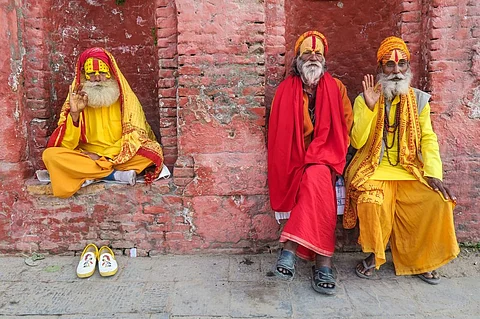WHAT IS UNIQUE ABOUT HINDUISM? HOW IS IT DIFFERENT FROM CHRISTIANITY AND ISLAM?
By Maria Wirth
Someone asked me this question in the course of an interview.
Here is what I replied:
Oh, there is so much uniqueness that it is hard to put it briefly.
Sanatana Dharma is the original, complete knowledge about what is true
I consider Vedic knowledge or Sanatana Dharma as the original, most ancient and complete knowledge about what is true regarding us and the universe. It is called today inadequately 'Hinduism'. An 'ism' usually means a fixed doctrine that must be believed, and Hinduism is the opposite of that. It allows the greatest freedom to connect with one's essential Self, gives hints and methods, and does not go against one's conscience. In contrast, Christianity and Islam put their doctrine above one's individual conscience. This has led to great suffering for humanity.
Later belief systems are limitations or distortions
The religious belief systems, which came later in time, are either limitations or distortions. Offshoots of Hindu dharma, like Buddhism, are limitations of the vast ocean of knowledge, because they demand from the follower to identify with only one of the sages or one set of texts. The Abrahamic religions are distortions because they demand not only belief in a Supreme Intelligence (in English called God), but also blind belief in wild claims about this God, which have no foundation in truth and actually are harmful for a harmonious living together.
Questions are encouraged
One more important difference: Hinduism encourages asking intelligent questions and using one's intelligence to its fullest in the search for truth. Yet Christianity and Islam don't want their followers to ask any questions or use their intelligence but want them to meekly accept what they are taught as 'the one and only truth'. This truth was allegedly revealed to only one human being and it divides humanity into those who follow this particular person and those who don't. Those who don't are dehumanized as unbelievers or heathen. This blind belief is of course not good for a healthy mindset, and the consequence of such fabricated division can be seen in history and also in the present. In Hinduism, it matters WHAT is said and whether it makes sense and not so much who said it. Yet in Christianity and Islam it only matters WHO said it. What the religious founder said must not be scrutinized but believed.
Hinduism has incredible knowledge, even now, though a huge amount of it has been destroyed. (Representational Image) | Unsplash
Unfortunately, a lot of knowledge got lost
Hinduism has incredible knowledge, even now, though a huge amount of it has been destroyed. Millions of texts were burned in Nalanda and Vikramshila by people who believed that only ONE book matters. Millions of Hindus were killed, many Brahmins among them, who were seen as the biggest enemy, as they had the knowledge in their heads. The former Shankaracharya of Kanchipuram, Sri Chandrashekharendra Saraswati, said that at the start of Kali Yuga, Veda Vyasa divided the four Vedas into over thousand Shakas, to make it easier for the Brahmins in Kali Yuga to memorize them. Only eight are still preserved in full. Only eight of over one thousand…. What painful loss.
Vedas were 'seen' or revealed
The insights of the Rishis were not ordinary. They shared what they had "seen" in cosmic awareness or in other words, the Vedas were revealed to them. This knowledge is said to be there right at the start of the universe. In contrast, Western historians claim that humans were primitive thousands of years ago. The great sages who handed down the Vedas were definitely more advanced, and I wished Indian historians had the courage to stand by their inherited knowledge.
Just one example that completely stuns me: how could the ancient Indians map the sky so absolutely detailed and correctly? How could they know the distance to the sun and the moon, or discern the planets of our solar system from stars? How could they know that the twin stars of Vashisht and Arundhati, hardly visible, move around each other? And even more astonishing, how could they develop astrology, know the qualities of the planets, their influence? It truly needed an intimate connection with the cosmic awareness. They must have experienced that the whole cosmos with its planets and stars is alive, is a manifestation of Purusha himself, and they could reach out to it or rather see it within the vast space in themselves.
(Disclaimer: This is a sponsored article and includes some commercial links.)


